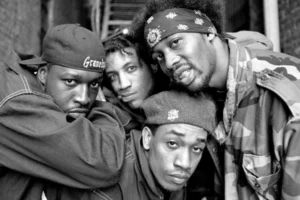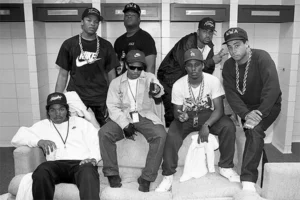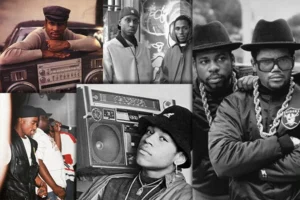THE STORY OF RHYMES, RHYTHMS, RESONANCE

50 Years of Hip Hop: The Story of Rhymes, Rhythms, and Resonance
Hip hop, born from the streets of the Bronx in the early 1970s, has traversed an extraordinary 50-year journey, marked by significant milestones and the emergence of influential artists who have reshaped the musical and cultural landscape. This genre, which began as a voice for marginalized communities, has grown into a global phenomenon that continues to influence and resonate with diverse socio-political landscapes.

One milestone in hip hop’s history is its transition from local street parties to a global cultural force. Its roots lie in block parties and dance battles, but it quickly evolved into a platform for self-expression and storytelling. The 1980s witnessed the rise of trailblazing artists like Grandmaster Flash and Run-D.M.C., who paved the way for the genre’s mainstream acceptance.
Certain artists stand out for their immense influence. Tupac Shakur, with his candid lyricism, tackled issues of inequality, police brutality, and poverty. Public Enemy’s politically charged music confronted racial injustice, inspiring activism. Not to be overlooked is Jay-Z, who not only achieved commercial success but also became a symbol of entrepreneurship, advocating for economic empowerment within marginalised communities.

Hip hop’s impact on socio-political landscapes cannot be overstated. Its ability to provide a voice for marginalized communities has been a catalyst for social change. From N.W.A’s critique of police brutality to Kendrick Lamar’s exploration of African-American identity, hip hop has challenged societal norms and sparked necessary conversations. In the wake of the Black Lives Matter movement, artists like J. Cole and Cardi B have used their platforms to address systemic racism and advocate for justice.

In conclusion, hip hop’s 50-year journey is replete with milestones that have transformed it into a global cultural phenomenon. Influential artists have shaped its evolution, using their lyrics to challenge social norms and raise awareness of critical issues. This genre’s ability to influence socio-political landscapes underscores its significance as a powerful force for change, proving that music can transcend entertainment and become a catalyst for progress.
Aromatic Elegance: Omani Perfume Craftsmanship and Heritage
A country steeped in ancient history and rich cultural heritage, Oman is known not only for its music, food and traditional handicrafts, but also for its exquisite fragrances that hold a special place in people’s hearts. Crafted with meticulous care and an artistry passed down through generations, Omani perfume weaves together a story of tradition, craftsmanship, and cultural significance.

The creation of Omani perfume is a harmonious blend of skill and nature’s bounty. One of the most iconic ingredients is frankincense, harvested from the resin of Boswellia trees. The resin is carefully collected, dried, and then distilled to extract the precious essential oil, giving rise to a deep, resinous base note that characterises many Omani fragrances. Another treasured element is oud, an aromatic wood sourced from Aquilaria trees. Its smoky and woody aroma adds complexity to the perfumes, evoking a sense of mystique.
The art of crafting Omani perfume extends beyond ingredients to the hands of skilled artisans who infuse each creation with passion and cultural heritage. Traditional techniques, often passed down within families, involve blending essential oils, resins, and other natural materials. The result is a symphony of scents that reflects the very essence of Oman itself.

The importance of Omani perfume in the customs of the Omani people cannot be understated. Perfume is interwoven into daily life, from personal grooming to religious rituals and social gatherings. The aromatic embrace of these fragrances is a gesture of welcome and respect, enhancing the experience of hospitality that Omanis hold dear. In religious practices, perfumes are used to purify and sanctify spaces, symbolizing a connection between the physical and the divine.
In conclusion, if you want to experience Oman’s aromatic elegance and hospitality explore Omani perfume outlets with Mumayizat discount and reward yourself with fragrances crafted with time-honored traditions and infused with the essence of frankincense and oud of the Sultanate.
Footwear Magic: From Ache to Ease
Footwear is an essential aspect of daily life, often underestimated in its significance. Selecting the correct pair of shoes goes beyond mere fashion; it directly impacts our comfort, health, and overall well-being. Making an uninformed choice can lead to a range of negative consequences, while the right pair can address and even prevent many of these issues.

When individuals fail to choose appropriate footwear, they open themselves up to a host of potential problems. Ill-fitting shoes can cause discomfort, blisters, calluses, and even more severe issues such as bunions or hammertoes. Incorrect footwear choices may lead to improper weight distribution and posture, resulting in back pain, knee pain, and other musculoskeletal problems. Furthermore, inappropriate footwear can exacerbate pre-existing conditions, like plantar fasciitis or flat feet, causing pain and hindering mobility.
The correct pair of shoes, on the other hand, can effectively mitigate these drawbacks. Properly-fitted footwear provides adequate arch support, cushioning, and shock absorption, reducing the impact on joints and preventing injuries. For instance, shoes with proper arch support can alleviate pain associated with flat feet by promoting proper alignment. Cushioned insoles can prevent blisters and calluses, enhancing overall comfort.

Moreover, specialized footwear can play a crucial role in treating various foot conditions. Orthopedic shoes, designed with medical considerations in mind, can provide targeted support to treat issues like bunions or plantar fasciitis. Athletic shoes with advanced cushioning and stability features can aid athletes in preventing injuries and enhancing performance.
In conclusion, making the effort to choose suitable footwear is an investment in our physical well-being that pays dividends in the long run.

